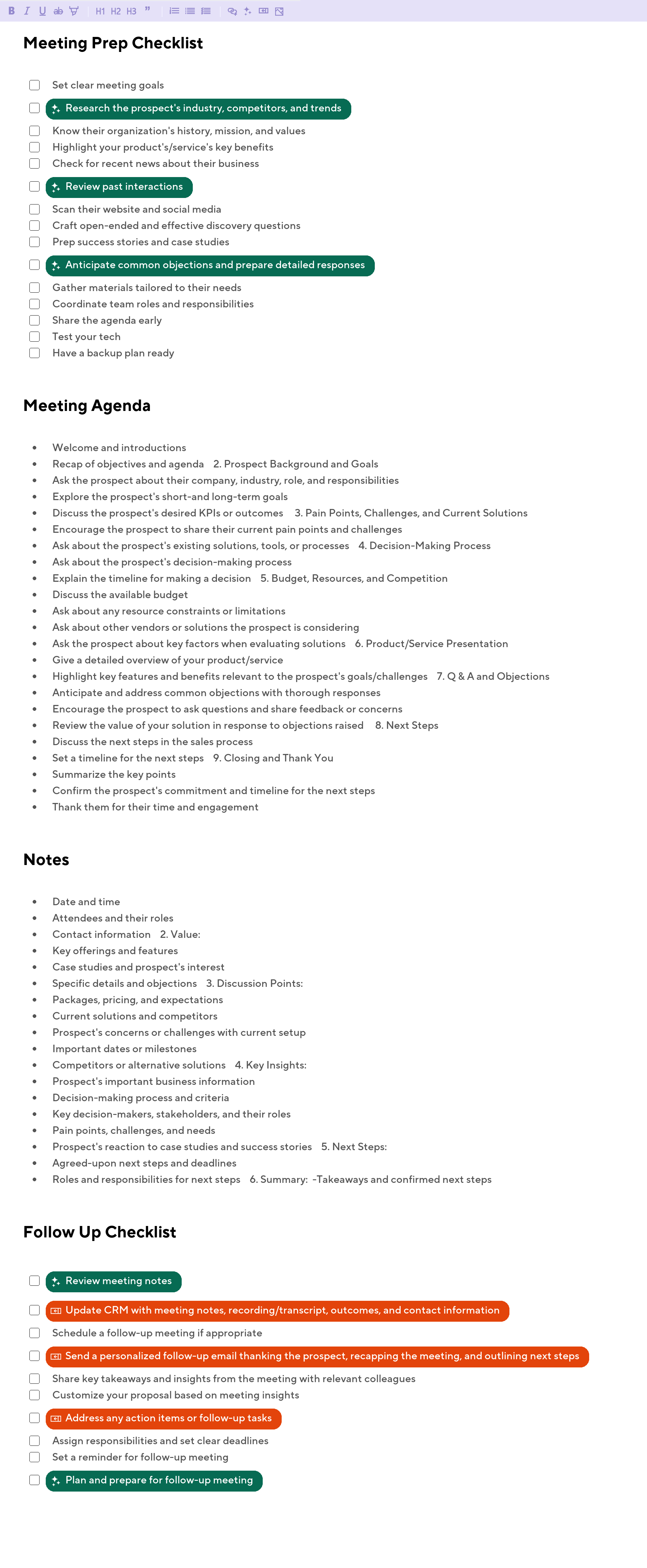Discovery Template
Meeting Prep Checklist
Set clear meeting goals
Research the prospect's industry, competitors, and trends
Know their organization's history, mission, and values
Highlight your product's/service's key benefits
Check for recent news about their business
Review past interactions
Scan their website and social media
Craft open-ended and effective discovery questions
Prep success stories and case studies
Anticipate common objections and prepare detailed responses
Gather materials tailored to their needs
Coordinate team roles and responsibilities
Share the agenda early
Test your tech
Have a backup plan ready
Meeting Agenda Template
- Opening and Agenda Review
- Welcome and introductions
- Recap of objectives and agenda
- Prospect Background and Goals
- Ask the prospect about their company, industry, role, and responsibilities
- Explore the prospect's short-and long-term goals
- Discuss the prospect's desired KPIs or outcomes
- Pain Points, Challenges, and Current Solutions
- Encourage the prospect to share their current pain points and challenges
- Ask about the prospect's existing solutions, tools, or processes
- Decision-Making Process
- Ask about the prospect's decision-making process
- Explain the timeline for making a decision
- Budget, Resources, and Competition
- Discuss the available budget
- Ask about any resource constraints or limitations
- Ask about other vendors or solutions the prospect is considering
- Ask the prospect about key factors when evaluating solutions
- Product/Service Presentation
- Give a detailed overview of your product/service
- Highlight key features and benefits relevant to the prospect's goals/challenges
- Q & A and Objections
- Anticipate and address common objections with thorough responses
- Encourage the prospect to ask questions and share feedback or concerns
- Review the value of your solution in response to objections raised
- Next Steps
- Discuss the next steps in the sales process
- Set a timeline for the next steps
- Closing and Thank You
- Summarize the key points
- Confirm the prospect's commitment and timeline for the next steps
- Thank them for their time and engagement
Meeting Notes Template
- Basic Info:
- Date and time
- Attendees and their roles
- Contact information
- Value:
- Key offerings and features
- Case studies and prospect's interest
- Specific details and objections
- Discussion Points:
- Packages, pricing, and expectations
- Current solutions and competitors
- Prospect's concerns or challenges with current setup
- Important dates or milestones
- Competitors or alternative solutions
- Key Insights:
- Prospect's important business information
- Decision-making process and criteria
- Key decision-makers, stakeholders, and their roles
- Pain points, challenges, and needs
- Prospect's reaction to case studies and success stories
- Next Steps:
- Agreed-upon next steps and deadlines
- Roles and responsibilities for next steps
- Summary: -Takeaways and confirmed next steps
Meeting Follow-up Checklist
Review meeting notes
Update CRM with meeting notes, recording/transcript, outcomes, and contact information
Schedule a follow-up meeting if appropriate
Send a personalized follow-up email thanking the prospect, recapping the meeting, and outlining next steps
Share key takeaways and insights from the meeting with relevant colleagues
Customize your proposal based on meeting insights
Address any action items or follow-up tasks
Assign responsibilities and set clear deadlines
Set a reminder for follow-up meeting
Plan and prepare for follow-up meeting
Maximize Your Meeting Success
Instantly use this template in Meetingflow:
- Connect your calendar to collaborative meeting plans
- Automatically update your CRM
- Take and manage collaborative notes
- Get AI customer follow-up emails and AI summaries
- Learn more about better meetings with Meetingflow
No credit card required.
